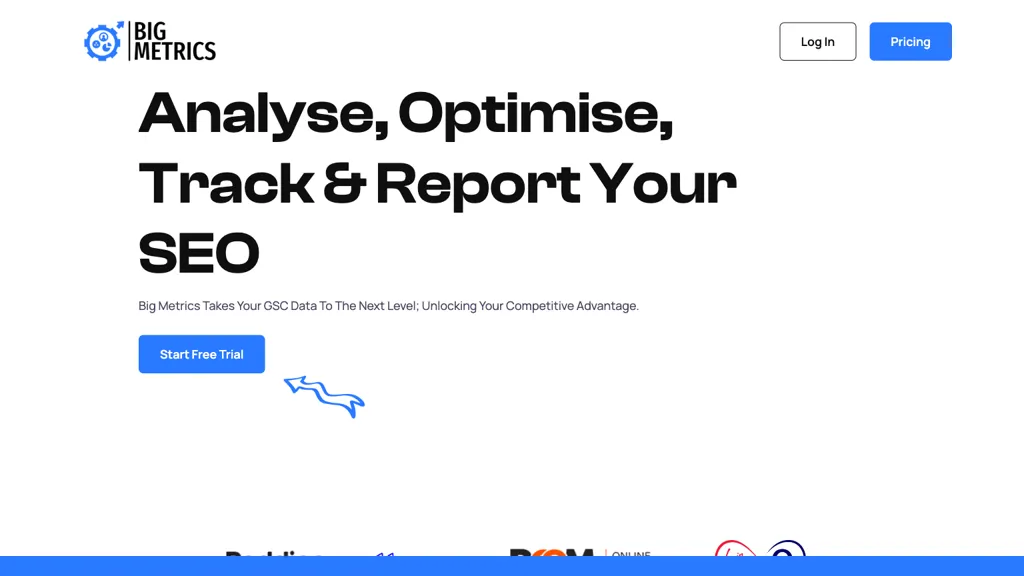What is Big Metrics?
Big Metrics is a powerful SEO platform designed to enhance website performance by leveraging data from Google Search Console. This innovative tool offers deep insights into a website’s SEO metrics, providing users with a competitive edge through advanced analytics and optimization techniques.
Big Metrics aims to refine SEO strategies by identifying areas of improvement, such as low click-through rate pages, distinguishing between brand and non-brand traffic, and preventing keyword cannibalization. The platform also emphasizes on-page optimization by aligning keywords with critical elements and boosting content engagement through a seamless content editor.
Big Metrics’ Key Features & Benefits
Big Metrics boasts a variety of features that cater to SEO professionals, businesses, and agencies looking to improve their search engine performance. Key features include:
- Predictive Analytics: Anticipate SEO performance and adjust strategies accordingly.
- Low Click-Through Rate Identification: Pinpoint and optimize underperforming pages.
- Brand vs Non-Brand Traffic Distinction: Understand traffic sources for better targeting.
- Keyword Cannibalization Prevention: Avoid competing against your own content.
- Seamless Content Editor: Effortlessly create optimized, keyword-rich content.
These features collectively offer numerous benefits, such as enhanced content engagement, improved on-page optimization, and actionable insights for superior SEO performance. The user-friendly interface and clear pricing structure further add to its appeal.
Big Metrics’ Use Cases and Applications
Big Metrics can be employed in various scenarios to boost SEO outcomes:
- Optimizing Low Click-Through Rate Pages: Increase organic traffic and maximize conversions by identifying and refining underperforming pages.
- Proactive SEO Strategy Adjustments: Utilize predictive analytics to forecast performance outcomes and stay ahead of competitors in search engine rankings.
- Content Engagement Enhancement: Create SEO-friendly, keyword-rich content effortlessly with the platform’s seamless content editor.
Industries and sectors that can benefit from Big Metrics include businesses, SEO professionals, website owners, and marketing teams. Case studies and success stories demonstrate the platform’s effectiveness in real-world applications.
How to Use Big Metrics
Using Big Metrics is straightforward, thanks to its intuitive interface. Here’s a step-by-step guide:
- Sign Up: Start with a free trial to explore the platform’s features.
- Connect Google Search Console: Link your GSC account to import and analyze data.
- Analyze Data: Use predictive analytics and segmentation features to identify areas for improvement.
- Optimize Content: Utilize the seamless content editor to create optimized content.
- Monitor Results: Track performance and make adjustments as necessary.
For best practices, focus on aligning keywords with critical elements, avoiding keyword cannibalization, and regularly updating content to maintain relevance.
How Big Metrics Works
Big Metrics operates by harnessing data from Google Search Console and applying advanced analytics to derive actionable insights. The platform uses algorithms to identify low click-through rate pages, distinguish between brand and non-brand traffic, and prevent keyword cannibalization. The workflow involves:
- Data Import: Importing data from Google Search Console.
- Data Analysis: Applying predictive analytics and segmentation to identify trends and opportunities.
- Content Optimization: Using the content editor to create and refine SEO-friendly content.
- Performance Monitoring: Continuously tracking and adjusting strategies based on performance data.
Big Metrics Pros and Cons
Like any tool, Big Metrics has its strengths and potential drawbacks:
- Pros:
- Comprehensive analytics and insights.
- User-friendly interface and seamless content editor.
- Clear pricing structure with a free trial option.
- Cons:
- May require a learning curve for beginners.
- Dependence on Google Search Console data.
User feedback generally highlights the platform’s effectiveness and ease of use, with positive reviews from SEO professionals and businesses alike.
Big Metrics Pricing
Big Metrics offers a free trial to help users familiarize themselves with the platform. Upon completion, users can choose from the following pricing packages:
- Consultants: $49/month.
- Agencies: $229/month.
These pricing options are competitive and provide value for money, especially considering the platform’s robust features and capabilities.
Conclusion about Big Metrics
Big Metrics is a valuable SEO platform that offers deep insights and advanced optimization techniques to enhance website performance. With features like predictive analytics, low click-through rate identification, and a seamless content editor, it caters to a wide range of users, from businesses to SEO professionals.
The platform’s user-friendly interface, clear pricing structure, and effectiveness in real-world applications make it a top choice for those looking to refine their SEO strategies. Future developments and updates are likely to further enhance its capabilities, making it a tool worth considering for anyone serious about SEO.
Big Metrics FAQs
Q: What is Big Metrics?
A: Big Metrics is an SEO platform that leverages Google Search Console data to provide deep insights and advanced optimization techniques for improved website performance.
Q: Who can benefit from using Big Metrics?
A: Businesses, SEO professionals, website owners, and marketing teams can all benefit from using Big Metrics to enhance their SEO strategies.
Q: Does Big Metrics offer a free trial?
A: Yes, Big Metrics offers a free trial, allowing users to explore its features before committing to a paid plan.
Q: What are the pricing options for Big Metrics?
A: Big Metrics offers two main pricing packages: Consultants at $49/month and Agencies at $229/month.
Q: How does Big Metrics help prevent keyword cannibalization?
A: The platform identifies instances where your content may be competing against itself for the same keywords, allowing you to optimize and prevent keyword cannibalization.










